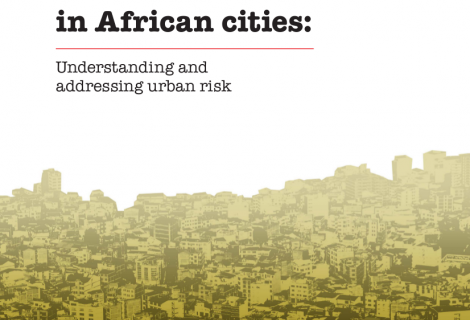
The population of Africa’s cities is growing rapidly. But as poor people cram into towns and cities characterised by limited, weak and often under-resourced infrastructure, they are increasingly relegated to marginal, inadequately serviced, informal settlements and low-cost housing areas, leaving them vulnerable to numerous livelihood, health and security risks.
The impact of disasters, conflict and climate change is most severe for poor households, especially groups such as poor women and children, as they have the least access to resources to mitigate and recover from disasters. Disasters undo progress in achieving developmental goals, such as gains in education, healthcare and economic progress, and prevent vulnerable women, men and children from being able to claim their rights to basic needs such as food, shelter, work and healthcare. They also erode individual and household resources, undermining livelihoods and the realisation of human rights, which in turn increases vulnerability to disasters of all magnitudes. Climate change is compounding existing risks and creating new ones, placing additional pressure on urban poor people.
As part of its programme on strengthening urban resilience in African cities, ActionAid commissioned research to better understand the risks faced by urban poor people on the African continent. This exploratory research comprised a desktop review of the literature on urban risk in Africa, and fieldwork in three cities in Senegal, The Gambia and Zimbabwe. It examined hazards, vulnerabilities, local capacities, power imbalances and underlying risk drivers to identify strategies for enhancing resilience to disasters, climate change and conflict in Africa’s urban environments.
Key findings
This research shows that disaster risks in towns and cities are strongly linked to underdevelopment. Insecure livelihoods; a lack of basic infrastructure and services such as water and waste management; poor urban and land planning; inadequate oversight of urban planning, land-use and building standards; as well as low accountability for the provision of infrastructure and basic services all increase poor people’s exposure to hazards, and vulnerability to their effects. Consequently, reducing risk and building resilience to disasters in urban areas requires tackling the developmental issues that underlie it. This requires improving infrastructure and services, and strengthening livelihoods, all of which are critical in reducing exposure to hazards and enhancing people’s ability to cope with and recover from disasters. It is essential to facilitate and support efforts by governments to reduce risk, while at the same time holding them to account through transparent, responsive and proactive governance structures. It is equally important to involve the private sector, as business and industry often contribute to risk on the continent.